7 start with B start with B
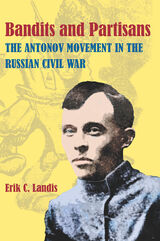
Landis examines both sides of the conflict, probing the testimonies of the insurgents, their opponents, and those caught in between. We witness firsthand the frustrations, failures, and internal conflicts of the Bolsheviks and the spirit of rebellion that drove the insurgents and helped drive a localized dispute into a well-organized mass rebellion that struck fear in the hearts of Communist leaders. This political and military threat was influential in bringing about Lenin's conciliatory New Economic Policy, which allowed farmers and villages to sustain themselves in a quasi-market economy.
Bandits and Partisans presents a gripping tale of brutality, domination, and revolt, placing readers at the frontlines of the complex and rich history of the Russian civil war and the consolidation of the new Soviet state.
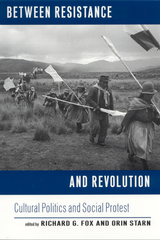
Peasants in India hugging trees to protest logging, Brazilian feminists marching to impeach a president, Okinawan television comedians joke-starting ethnic activity. All are instances of social protest that exist in the charged territory between the cataclysmic upheaval of revolutionary war and the everyday acts of private resistance. Yet these movements "in between" resistance and revolution have remained invisible to scholars of politics, culture, and society. Leading scholars in anthropology, political science, history, sociology, and ethnomusicology examine dissent and direct action in Australia, Brazil, Germany, Colombia, India, Korea, Peru, and the United States and demonstrate the importance of looking beyond these poles of protest to the midways of mobilization.
The contributors are Nancy Abelmann, Sonia Alvarez, Arturo Escobar, Richard Fox, Faye Ginsburg, Ramachandra Guha, Ingrid Monson, Yoshinobu Ota, Orin Starn, and Nathan Stoltzfus.
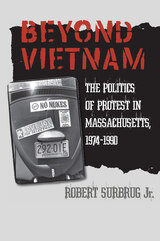
In Beyond Vietnam: The Politics of Protest in Massachusetts, 1974–1990, Robert Surbrug challenges this prevailing paradigm by examining three protest movements that were direct descendants of Vietnam-era activism: the movement against nuclear energy; the nuclear weapons freeze movement; and the Central American solidarity movement. Drawing lessons from the successes and failures of the preceding era, these movements had a significant impact on the liberal wing of the Democratic Party, which itself had been undergoing major transformations in the wake of the 1960s.
By focusing on one state—Massachusetts—Surbrug is able to illuminate the interaction between the activist left and mainstream liberalism, showing how each influenced the other and how together they helped shape the politics of the 1970s and 1980s. During these years, Massachusetts emerged as a center of opposition to nuclear power, the continuing Cold War arms race, and Ronald Reagan's interventionist policies in Central America. The state's role in national policy was greatly enhanced by prominent political figures such as Senator Edward Kennedy, Speaker of the House Thomas "Tip" O'Neill, presidential candidate Governor Michael Dukakis, Vietnam veteran Senator John Kerry, and moderate Republican Silvio Conte.
What Beyond Vietnam shows is that the rise of the right in the aftermath of the 1960s was by no means a unilateral ascendancy. Instead it involved a bifurcation of American politics in which an increasingly strong conservative movement was vigorously contested by an activist left and a reinvigorated mainstream liberalism.

Based on a thorough investigation of underground publications and interviews with important activists of the period from 1976-1989, Doucette shows how the independent press, rooted in the long Polish tradition of well-organized resistance to foreign occupation, reshaped this tradition to embrace nonviolent civil resistance while creating a network that evolved from a small group of dissidents into a broad opposition movement with cross-national ties and millions of sympathizers. It was the galvanizing force in the resistance to communism and the rebuilding of Poland’s democratic society.
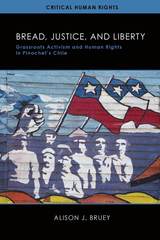
<i>Named Best Social Science Book, LASA Southern Cone Studies Section</i>
In Santiago, Chile, poverty and state violence have often led to grassroots resistance movements among the poor and working class. Alison J. Bruey offers a compelling history of the struggle for social justice and democracy during the Pinochet dictatorship. Deeply grounded by both extensive oral history interviews and archival research, Bread, Justice, and Liberty provides innovative contributions to scholarship on Chilean history, social movements, popular protest and democratization, neoliberal economics, and the Cold War in Latin America.
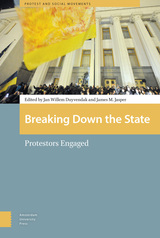
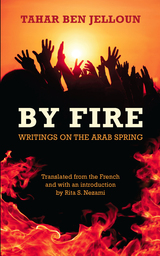
Tahar Ben Jelloun’s By Fire, the first fictional account published on the Arab Spring, reimagines the true-life self-immolation of Mohamed Bouazizi in Tunisia, an event that has been credited with setting off the Tunisian revolt. The novella depicts the days leading up to Bouazizi’s self-immolation. Ben Jelloun’s deliberate ambiguity about the location of the story, set in an unnamed Islamic country, allows the reader to imagine the experiences and frustrations of other young men who have endured physical violence and persecution in places beyond Tunisia. The tale begins and ends in fire, and the imagery of burning frames the political accounts in The Spark, Ben Jelloun’s nonfiction writings on the Tunisian events that provide insight into the despotic regimes that drove Bouazizi to such despair. Rita S. Nezami’s elegant translations and critical introduction provide the reader with multiple strategies for approaching these potent texts.
READERS
Browse our collection.
PUBLISHERS
See BiblioVault's publisher services.
STUDENT SERVICES
Files for college accessibility offices.
UChicago Accessibility Resources
home | accessibility | search | about | contact us
BiblioVault ® 2001 - 2024
The University of Chicago Press









